Which Are Better Footman for Spearman in Art of Conquest
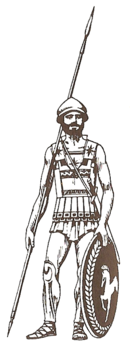
A spear is a pole weapon consisting of a shaft, usually of wood, with a pointed head. The head may be merely the sharpened end of the shaft itself, as is the case with fire hardened spears, or it may be fabricated of a more durable textile fastened to the shaft, such as bone, flint, obsidian, atomic number 26, steel, or statuary. The most common blueprint for hunting or combat spears since aboriginal times has incorporated a metal spearhead shaped like a triangle, lozenge, or leafage. The heads of line-fishing spears usually feature barbs or serrated edges.
The word spear comes from the Old English spere, from the Proto-Germanic speri, from a Proto-Indo-European root *sper- "spear, pole". Spears can exist divided into ii broad categories: those designed for thrusting equally a melee weapon and those designed for throwing as a ranged weapon (usually referred to as javelins or darts).
The spear has been used throughout man history both equally a hunting and fishing tool and as a weapon. Along with the order, knife, and axe, it is one of the earliest and virtually of import tools developed past early on humans. As a weapon, it may be wielded with either one or ii hands. It was used in virtually every conflict up until the modern era, where fifty-fifty then information technology continues on in the form of the stock-still bayonet on a long gun, and is probably the near commonly used weapon in history.[one] In conflicts such equally the 2020–2022 Communist china–India skirmishes, where firearms are prohibited, spears continue to run across military use.
Origins [edit]
Spear manufacture and use is non confined to humans. It is also skillful by the western chimpanzee. Chimpanzees near Kédougou, Senegal accept been observed to create spears by breaking straight limbs off trees, stripping them of their bawl and side branches, and sharpening 1 end with their teeth. They then used the weapons to hunt galagos sleeping in hollows.[2]
Prehistory [edit]
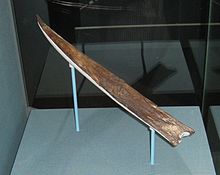

Archaeological evidence constitute in nowadays-solar day Germany documents that wooden spears take been used for hunting since at least 400,000 years ago,[three] and a 2012 written report from the site of Kathu Pan in Due south Africa suggests that hominids, possibly Homo heidelbergensis, may have developed the technology of hafted stone-tipped spears in Africa about 500,000 years ago.[iv] [5] Wood does non preserve well, withal, and Craig Stanford, a primatologist and professor of anthropology at the University of Southern California, has suggested that the discovery of spear use by chimpanzees means that early humans may accept used wooden spears earlier this.[half dozen]
Neanderthals were amalgam stone spear heads from every bit early as 300,000 BP, and by 250,000 years agone, wooden spears were made with fire-hardened points.
From circa 200,000 BCE onwards, Middle Paleolithic humans began to make complex rock blades with flaked edges which were used every bit spear heads. These stone heads could exist fixed to the spear shaft past gum or resin or by bindings made of animal sinew, leather strips or vegetable thing. During this period, a articulate difference remained between spears designed to be thrown and those designed to exist used in hand-to-hand combat. By the Magdalenian period (c. 15,000–9500 BCE), spear-throwers similar to the later atlatl were in use.[seven]
Military [edit]

Europe [edit]
Classical antiquity [edit]
Ancient Greeks [edit]
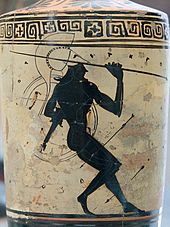
Athenian warrior wielding a spear in battle
The spear is the chief weapon of the warriors of Homer'southward Iliad. The use of both a single thrusting spear and two throwing spears are mentioned. Information technology has been suggested that two styles of gainsay are being described; an early on style, with thrusting spears, dating to the Mycenaean menstruation in which the Iliad is fix, and, anachronistically, a subsequently style, with throwing spears, from Homer's own Primitive period.[8]
In the 7th century BCE, the Greeks evolved a new close-guild infantry formation, the phalanx.[9] The key to this formation was the hoplite, who was equipped with a large, circular, statuary-faced shield (aspis) and a 7–9 ft (two.i–2.7 m) spear with an iron head and bronze butt-spike (doru).[10] The hoplite phalanx dominated warfare among the Greek City States from the 7th into the fourth century BCE.
The 4th century saw major changes. One was the greater apply of peltasts, low-cal infantry armed with spear and javelins.[xi] The other was the development of the sarissa, a two-handed pike 18 ft (5.five thou) in length, by the Macedonians nether Phillip of Macedon and Alexander the Not bad.[12] The pike phalanx, supported past peltasts and cavalry, became the dominant mode of warfare among the Greeks from the late 4th century onward[13] until Greek armed forces systems were supplanted past the Roman legions.
Ancient Romans [edit]

Re-enactor outfitted as a Late Roman legionary conveying a pilum
In the pre-Marian Roman armies, the beginning two lines of battle, the hastati and principes, often fought with a sword chosen a gladius and pila, heavy javelins that were specifically designed to exist thrown at an enemy to pierce and foul a target'southward shield. Originally the principes were armed with a short spear chosen a hasta, just these gradually fell out of use, somewhen existence replaced by the gladius. The 3rd line, the triarii, continued to use the hasta.
From the tardily 2d century BCE, all legionaries were equipped with the pilum. The pilum continued to be the standard legionary spear until the end of the 2nd century CE. Auxilia, however, were equipped with a simple hasta and, perhaps, javelins or darts. During the 3rd century CE, although the pilum continued to be used, legionaries unremarkably were equipped with other forms of throwing and thrusting spear, similar to auxilia of the previous century. By the fourth century, the pilum had effectively disappeared from common use.[xiv]
In the late period of the Roman Empire, the spear became more ofttimes used because of its anti-cavalry capacities as the barbarian invasions were often conducted past people with a developed civilisation of cavalry in warfare.
Medieval period [edit]
Later on the fall of the Western Roman Empire, the spear and shield connected to be used by nigh all Western European cultures. Since a medieval spear required only a modest amount of steel along the sharpened edges (near of the spear-tip was wrought iron), it was an economical weapon. Quick to industry, and needing less smithing skill than a sword, it remained the principal weapon of the common soldier. The Vikings, for instance, although ofttimes portrayed with axe or sword in hand, were armed mostly with spears,[15] every bit were their Anglo-Saxon, Irish, or continental contemporaries.
Infantry [edit]

Assyrian soldier holding a spear and wearing a helmet. Detail of a basalt relief from the palace of Tiglath-pileser III at Hadatu, Syria. 744–727 BCE. Ancient Orient Museum, Istanbul
Broadly speaking, spears were either designed to be used in melee, or to be thrown. Within this simple classification, there was a remarkable range of types. For example, M. J. Swanton identified thirty different spearhead categories and sub-categories in early Saxon England.[16] Well-nigh medieval spearheads were mostly leaf-shaped. Notable types of early medieval spears include the angon, a throwing spear with a long head similar to the Roman pilum, used by the Franks and Anglo-Saxons, and the winged (or lugged) spear, which had two prominent wings at the base of the spearhead, either to preclude the spear penetrating too far into an enemy or to aid in spear fencing.[17] Originally a Frankish weapon, the winged spear likewise was popular with the Vikings. It would go the ancestor of later medieval polearms, such as the partisan and spetum.
The thrusting spear also has the advantage of reach, being considerably longer than other weapon types. Exact spear lengths are hard to deduce as few spear shafts survive archaeologically simply 6–8 ft (1.8–two.4 thousand) would seem to accept been the norm. Some nations were noted for their long spears, including the Scots and the Flemish. Spears ordinarily were used in tightly ordered formations, such as the shield wall or the schiltron. To resist cavalry, spear shafts could exist planted against the basis.[18] William Wallace drew upwards his schiltrons in a circle at the Battle of Falkirk in 1298 to deter charging cavalry;[19] this was a widespread tactic sometimes known as the "crown" formation.[20] Thomas Randolph, 1st Earl of Moray used a round schiltron on the showtime day of the Boxing of Bannockburn. However, the rectangular schiltron was much more common and was used by King Robert the Bruce on the second solar day of the Battle of Bannockburn and in the Boxing of Erstwhile Byland when he defeated English armies.[21]
Throwing spears became rarer as the Middle Ages drew on, just survived in the hands of specialists such as the Catalan Almogavars.[22] They were commonly used in Ireland until the end of the 16th century.[23]
Spears began to lose fashion amid the infantry during the 14th century, being replaced by pole weapons that combined the thrusting properties of the spear with the cut properties of the axe, such as the halberd. Where spears were retained they grew in length, somewhen evolving into pikes, which would be a dominant infantry weapon in the 16th and 17th centuries.[24]
Cavalry [edit]
Cavalry spears were originally the aforementioned every bit infantry spears and were oft used with 2 hands or held with i manus overhead. In the 12th century, afterward the adoption of stirrups and a high-cantled saddle, the spear became a decidedly more than powerful weapon. A mounted knight would secure the lance past holding it with one hand and tucking it under the armpit (the couched lance technique)[25] This allowed all the momentum of the horse and knight to be focused on the weapon'south tip, whilst notwithstanding retaining accurateness and command. This utilise of the spear spurred the development of the lance as a distinct weapon that was perfected in the medieval sport of jousting.[26]
In the 14th century, tactical developments meant that knights and men-at-arms often fought on pes. This led to the practice of shortening the lance to near 5 ft (1.5 m).) to arrive more manageable.[27] Equally dismounting became commonplace, specialist pole weapons such as the pollaxe were adopted by knights and this practise ceased.[28]
Introduction of gunpowder [edit]
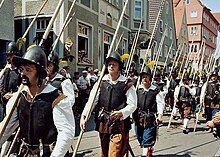
High german reenactors of pikemen
The development of both the long, two-handed expressway and gunpowder firearms in Renaissance Europe saw an e'er-increasing focus on integrated infantry tactics.[29] Those infantry not armed with these weapons carried variations on the pole-arm, including the halberd and the bill. At the start of the Renaissance, cavalry remained predominantly lance-armed; gendarmes with the heavy knightly lance and lighter cavalry with a variety of lighter lances. Past the 1540s, notwithstanding, pistol-armed cavalry called reiters were commencement to brand their mark. Cavalry armed with pistols and other lighter firearms, along with a sword, had nigh replaced lance armed cavalry in Western Europe by the beginning of the 17th century.[thirty]
Ultimately, the spear proper was rendered obsolete on the battlefield. Its last flowering was the half-pike or spontoon,[31] a shortened version of the pike carried past officers of various ranks. While originally a weapon, this came to be seen more as a badge of office, or leading staff past which troops were directed.[32] The half-pike, sometimes known equally a boarding throughway, was as well used equally a weapon on board ships until the late 19th century.[33]
Middle Due east [edit]
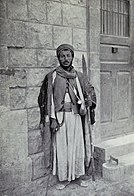
A Palestine Arab sufi austere carrying a short assegai in 1913.

Muslim warriors used a spear that was called an az-zaġāyah. Berbers pronounced it zaġāya, but the English language term, derived from the Old French via Berber, is "assegai". It is a pole weapon used for throwing or hurling, usually a light spear or javelin made of hard wood and pointed with a forged iron tip. The az-zaġāyah played an important office during the Islamic conquest every bit well as during later periods, well into the 20th century. A longer pole az-zaġāyah was beingness used equally a hunting weapon from horseback. The az-zaġāyah was widely used. It existed in various forms in areas stretching from Southern Africa to the Indian subcontinent, although these places already had their own variants of the spear. This javelin was the weapon of choice during the Fulani jihad as well as during the Mahdist War in Sudan. It is still being used by certain wandering Sufi ascetics (Derwishes).
Asia [edit]

Chinese [edit]
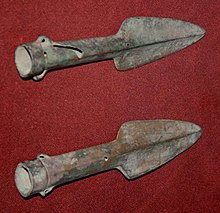
In the Chinese martial arts, the Chinese spear (Qiang 槍) is popularly known as the "king of weapons". The spear is listed in the group of the iv major weapons (along with the gun (staff), dao (a single-edged bract similar to a sabre), and the jian (sword)).[34]
Spears were used offset as hunting weapons amid the ancient Chinese. They became popular equally infantry weapons during the Warring States and Qin era, when spearmen were used as especially highly disciplined soldiers in organized group attacks. When used in germination fighting, spearmen would line up their large rectangular or round shields in a shieldwall fashion. The Qin also employed long spears (more akin to a throughway) in formations similar to Swiss pikemen in order to ward off cavalry. The Han Empire would employ like tactics as its Qin predecessors. Halberds, polearms, and dagger axes were likewise common weapons during this time.
Spears were also common weaponry for Warring States, Qin, and Han era cavalry units. During these eras, the spear would develop into a longer lance-similar weapon used for cavalry charges.
There are many words in Chinese that would be classified every bit a spear in English language. The Mao is the predecessor of the Qiang. The first bronze Mao appeared in the Shang dynasty. This weapon was less prominent on the battleground than the ge (dagger-axe). In some archaeological examples two tiny holes or ears can be constitute in the blade of the spearhead nigh the socket, these holes were presumably used to attach tassels, much similar modern day wushu spears.

A bronze spear, notice the ears on the side of the socket.

In the early on Shang, the Mao appeared to accept a relatively short shaft as well as a relatively narrow shaft every bit opposed to Mao in the later Shang and Western Zhou menses. Some Mao from this era are heavily decorated every bit is evidenced by a Warring States flow Mao from the Ba Shu surface area.[35]
In the Han dynasty the Mao and the Ji (戟 Ji tin be loosely defined as a halberd) rose to prominence in the military. Interesting to note is that the amount of fe Mao-heads establish exceeds the number of bronze heads. By the end of the Han dynasty (Eastern Han) the process of replacement of the atomic number 26 Mao had been completed and the statuary Mao had been rendered completely obsolete. Subsequently the Han dynasty toward the Sui and Tang dynasties the Mao used by cavalry were fitted with much longer shafts, equally is mentioned in a higher place. During this era, the utilise of the Shuo (矟) was widespread among the footmen. The Shuo can be likened to a expressway or merely a long spear.[36]
After the Tang dynasty, the popularity of the Mao declined and was replaced by the Qiang (枪). The Tang dynasty divided the Qiang in four categories: "一曰漆枪, 二曰木枪, 三曰白杆枪, 四曰扑头枪。" Roughly translated the four categories are: Qi (a kind of woods) Spears, Wooden Spears, Bai Gan (A kind of woods) Spears and Pu Tou Qiang. The Qiang that were produced in the Song and Ming dynasties consisted of four major parts: Spearhead, Shaft, End Spike and Tassel. The types of Qiang that exist are many. Amid the types there are cavalry Qiang that were the length of one zhang (11 feet and nine inches or iii.58 m), Litte-Bloom Spears (Xiao Hua Qiang 小花枪) that are the length of ane person and their arm extended above his head, double hooked spears, single hooked spears, ringed spears and many more than.[37]
There is some confusion as to how to distinguish the Qiang from the Mao, equally they are obviously very similar. Some people say that a Mao is longer than a Qiang, others say that the primary divergence is between the stiffness of the shaft, where the Qiang would be flexible and the Mao would be stiff. Scholars seem to lean toward the latter explanation more than the former. Because of the departure in the structure of the Mao and the Qiang, the usage is likewise different, though there is no definitive answer equally to what exactly the differences are betwixt the Mao and the Qiang.[38]
Bharat [edit]
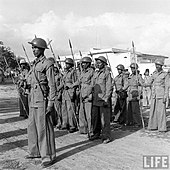
Razakars during Functioning Polo

Spears are known every bit Bhala in Indian languages.[39] Spears in the Indian society were used both in missile and non-missile form, both by cavalry and foot-soldiers. Mounted spear-fighting was skillful using with a ten-pes, ball-tipped wooden lance called a bothati, the end of which was covered in dye then that hits may exist confirmed. Spears were synthetic from a diversity of materials such as the sang fabricated completely of steel, and the ballam which had a bamboo shaft.
The Arab presence in Sindh and the Mameluks of Delhi introduced the Middle Eastern javelin into Bharat.
The Rajputs wielded a type of spear for infantrymen which had a club integrated into the spearhead, and a pointed butt end. Other spears had forked blades, several spear-points, and numerous other innovations. 1 particular spear unique to Bharat was the vita or corded lance.
Used by the Maratha army, information technology had a rope connecting the spear with the user's wrist, allowing the weapon to be thrown and pulled back. The Vel is a type of spear or lance, originated in Southern India, primarily used past Tamils.[40] [41]
Sikh Nihangs sometimes comport a spear even today. Spears were used in conflicts and training by armed paramilitary units such equally the razakars of Nizams of Hyderabad State as late equally the second one-half of the 20th century.
Nihon [edit]
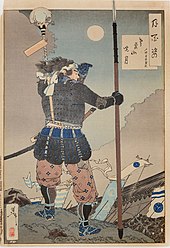
Ukiyo-e print of a samurai general holding a yari in his right hand
The hoko spear was used in ancient Japan sometime between the Yayoi period and the Heian menstruation, but it became unpopular as early on samurai often acted as horseback archers. Medieval Nihon employed spears again for infantrymen to use, simply it was non until the 11th century in that samurai began to prefer spears over bows. Several polearms were used in the Japanese theatres; the naginata was a glaive-like weapon with a long, curved blade popularly amidst the samurai and the Buddhist warrior-monks, often used confronting cavalry; the yari was a longer polearm, with a straight-bladed spearhead, which became the weapon of choice of both the samurai and the ashigaru (footmen) during the Warring States Era; the horseback samurai used shorter yari for his single-armed gainsay; on the other hand, ashigaru infantries used long yari (similar with European state highway) for their massed combat germination.
Philippines [edit]

A Filipino warrior property a Sibat (spear) in the Boxer Codex.
Filipino spears (sibat) were used every bit both a weapon and a tool throughout the Philippines. It is also called a bangkaw (subsequently the Bankaw Revolt.), sumbling or palupad in the islands of Visayas and Mindanao. Sibat are typically made from rattan, either with a sharpened tip or a caput made from metal. These heads may either be unmarried-edged, double-edged or barbed. Styles vary according to function and origin. For example, a sibat designed for fishing may not be the aforementioned as those used for hunting.
The spear was used as the primary weapon in expeditions and battles against neighbouring island kingdoms and it became famous during the 1521 Battle of Mactan, where the chieftain Lapu Lapu of Cebu fought confronting Spanish forces led by Ferdinand Magellan who was later on killed.
Africa [edit]
| | This department needs expansion. You can help by calculation to it. (April 2010) |

The various types of the assegai (a light spear or javelin made of wood and pointed with iron or burn-hardened tip) were used throughout Africa and it was the well-nigh common weapon used before the introduction of firearms. The Zulu, Xhosa and other Nguni tribes of South Africa were renowned for their apply of the assegai.
Shaka of the Zulu invented a shorter stabbing spear with a two-foot (0.61m) shaft and a larger, broader blade i pes (0.3m) long. This weapon is otherwise known every bit the iklwa or ixwa, later on the sound that was heard as it was withdrawn from the victim'southward wound.[42] [43] The traditional spear was not abased, merely was used to range attack enemy formations earlier closing in for close quarters boxing with the iklwa. This tactical combination originated during Shaka'south military machine reforms. This weapon was typically used with one hand while the off hand held a cowhide shield for protection.
The Americas [edit]
West Mexico and South America (Pre-Republic of colombia) [edit]
Every bit advanced metallurgy was largely unknown in pre-Columbian America outside of Western Mexico and Due south America, most weapons in Meso-America were made of wood or obsidian. This did non hateful that they were less lethal, as obsidian may be sharpened to become many times sharper than steel.[44] Meso-American spears varied greatly in shape and size. While the Aztecs preferred the sword-like macuahuitl for fighting,[45] the advantage of a far-reaching thrusting weapon was recognised, and a large portion of the army would acquit the tepoztopilli into battle.[46] The tepoztopilli was a pole-arm, and to judge from depictions in various Aztec codices, information technology was roughly the elevation of a man, with a broad wooden head about twice the length of the users' palm or shorter, edged with razor-precipitous obsidian blades which were deeply prepare in grooves carved into the head, and cemented in place with bitumen or plant resin equally an adhesive. The tepoztopilli was able both to thrust and slash effectively.
Throwing spears also were used extensively in Meso-American warfare, usually with the help of an atlatl.[47] Throwing spears were typically shorter and more than stream-lined than the tepoztopilli, and some had obsidian edges for greater penetration.
Native Americans [edit]
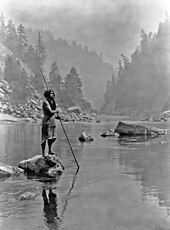
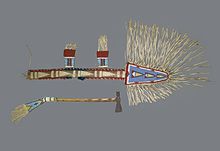
Typically, most spears made by Native Americans were created with materials surrounded by their communities. Usually, the shaft of the spear was made with a wooden stick while the head of the spear was fashioned from arrowheads, pieces of metal such equally copper, or a bone that had been sharpened. Spears were a preferred weapon past many since it was inexpensive to create, could more hands be taught to others, and could be made speedily and in large quantities.
Native Americans used the buffalo pound method to kill buffalo, which required a hunter to dress as a buffalo and lure one into a ravine where other hunters were hiding. In one case the buffalo appeared, the other hunters would kill him with spears. A variation of this technique, chosen the buffalo jump, was when a runner would lead the animals towards a cliff. As the buffalo got close to the cliff, other members of the tribe would jump out from behind rocks or trees and scare the buffalo over the cliff. Other hunters would be waiting at the lesser of the cliff to spear the animal to death.[48]
Hunting [edit]

One of the primeval forms of killing prey for humans, hunting game with a spear and spear angling continues to this twenty-four hours every bit both a ways of catching nutrient and as a cultural activity. Some of the most common prey for early humans were mega brute such as mammoths which were hunted with various kinds of spear. I theory for the 4th extinction event was that most of these animals were hunted to extinction by humans with spears. Even after the invention of other hunting weapons such as the bow the spear continued to be used, either as a projectile weapon or used in the hand as was common in boar hunting.
| | This section needs expansion. You can help by adding to it. (March 2010) |
Types [edit]
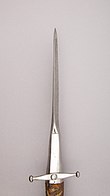
- Barred spears: A barred spear has a crossbar beneath the blade, to prevent too deep a penetration of the spear into an animal. The bar may be forged as role of the spearhead or may exist more loosely tied by means of loops below the blade. Barred spears are known from the Statuary Age, but the outset historical record of their use in Europe is found in the writings of Xenophon in the 5th century BCE.[49] Examples likewise are shown in Roman art. In the Middle Ages, a winged or lugged state of war-spear was developed (encounter above), just the later Middle Ages saw the development of specialised types, such every bit the boar-spear and the bear-spear.[fifty] The boar-spear could be used both on pes or horseback.
- Javelin
- Harpoon
- Trident
Modern revival [edit]
Spear hunting fell out of favour in virtually of Europe in the 18th century, but continued in Frg, enjoying a revival in the 1930s.[51] Spear hunting is nevertheless practiced in the United States.[52] Animals taken are primarily wild boar and deer, although trophy animals such as cats and big game as large every bit a Greatcoat Buffalo are hunted with spears. Alligators are hunted in Florida with a type of harpoon.
In myth and fable [edit]
Symbolism [edit]

Like many weapons, a spear may also be a symbol of power.
The Celts would symbolically destroy a expressionless warrior's spear either to preclude its use by another or as a sacrificial offering.
In classical Greek mythology Zeus' bolts of lightning may be interpreted as a symbolic spear. Some would behave that interpretation to the spear that oft is associated with Athena, interpreting her spear equally a symbolic connection to some of Zeus' power across the Aegis one time he rose to replacing other deities in the pantheon. Athena was depicted with a spear prior to that change in myths, yet. Chiron's wedding-souvenir to Peleus when he married the nymph Thetis in classical Greek mythology, was an cadaverous spear as the nature of ashwood with its straight grain made it an platonic option of forest for a spear.
The Romans and their early enemies would force prisoners to walk underneath a 'yoke of spears', which humiliated them. The yoke would consist of three spears, 2 upright with a third tied between them at a summit which made the prisoners stoop.[53] It has been suggested that the system has a magical origin, a fashion to trap evil spirits.[54] The word subjugate has its origins in this do (from Latin sub = under, jugum = yoke).[55]
In Norse mythology, the god Odin'southward spear (named Gungnir) was made by the sons of Ivaldi. It had the special holding that it never missed its mark. During the War with the Vanir, Odin symbolically threw Gungnir into the Vanir host. This exercise of symbolically casting a spear into the enemy ranks at the get-go of a fight was sometimes used in historic clashes, to seek Odin'south support in the coming battle.[56] In Wagner's opera Siegfried, the haft of Gungnir is said to be from the "Earth-Tree" Yggdrasil.[57]
Other spears of religious significance are the Holy Lance[58] and the Lúin of Celtchar,[59] believed by some to have vast mystical powers.
Sir James George Frazer in The Golden Bough [60] noted the phallic nature of the spear and suggested that in the Arthurian legends the spear or lance functioned as a symbol of male fertility, paired with the Grail (as a symbol of female fertility).

The Hindu god of war Murugan is worshipped by Tamils in the class of the spear called Vel, which is his chief weapon.[61]
The term spear is as well used (in a somewhat primitive manner) to describe the male line of a family, as opposed to the distaff or female line.
[edit]
- Amenonuhoko, spear of Izanagi and Izanami, creator gods in Japanese mythology
- Gáe Bulg, spear of Cúchulainn, hero in Irish mythology
- Gáe Buide and Gáe Derg, spears of Diarmuid Ua Duibhne which could inflict wounds that none can recover from
- Green Dragon Crescent Blade, a guan dao wielded by General Guan Yu in the Romance of the Three Kingdoms
- Gungnir, spear of Odin, a god in Norse mythology
- Holy Lance, said to exist the spear that pierced the side of Jesus
- Rhongomyniad referred to simply every bit Ron ("spear") in Geoffrey of Monmouth'southward History of United kingdom, the spear of Male monarch Arthur.[62] [ verification needed ]
- Serpent Spear wielded by Full general Zhang Fei in the Romance of the Three Kingdoms
- Spear of Fuchai, the spear used past Goujian's arch-rival, Male monarch Fuchai of Wu, in China
- Spear of Lugh, named after Lugh, a god in Irish mythology
- Trident, a 3-pronged fishing spear associated with a number of water deities, including the Etruscan Nethuns, Greek Poseidon, and Roman Neptune.
- Trishula, a 3-pronged spear wielded past the Hindu deities Durga and Shiva
- Vel, a flattened broad tipped spear used by the Hindu deity Murugan
See also [edit]
- List of types of spears
- Viking Age arms and armour
- Projectile
Related weapons:
- Arrow (weapon)
- Assegai
- Atlatl
- Bill (weapon)
- Dart (missile)
- Glaive
- Halberd
- Javelin
- Kontos (weapon)
- Lance
- Naginata
- Thruway (weapon)
- Pilum
- Pole weapon
- Spear thrower
- Woomera (spear-thrower)
- Xyston
Notes and references [edit]
- ^ Weir, William. 50 Weapons That Inverse Warfare. The Career Printing, 2005, p 12.
- ^ Pruetz, Jill D.; Bertolani, Paco (2007). "Savanna Chimpanzees, Pan troglodytes verus, Hunt with Tools". Current Biological science. 17 (5): 412–417. doi:10.1016/j.cub.2006.12.042. PMID 17320393. S2CID 16551874.
- ^ Thieme, Hartmut (1997-02-27). "Lower Palaeolithic hunting spears from Federal republic of germany". Nature. 385 (6619): 807–810. Bibcode:1997Natur.385..807T. doi:ten.1038/385807a0. PMID 9039910. S2CID 4283393. Retrieved 2017-01-09 .
- ^ Monte Morin, "Stone-tipped spear may have much earlier origin", Los Angeles Times, Nov 16, 2012
- ^ J. Wilkins et al. "Evidence for early on hafted hunting technology". Science, Vol. 338, Nov. 16, 2012, p. 942. doi:10.1126/science.1227608.
- ^ Rick Weiss, "Chimps Observed Making Their Own Weapons", The Washington Mail, February 22, 2007
- ^ Wymer, John (1982). The Palaeolithic Age. London: Croom Helm. p. 192. ISBN978-0-7099-2710-5.
- ^ Webster, T.B.L. (1977). From Mycenae to Homer. London: Methuen. pp. 166–8. ISBN978-0-416-70570-half-dozen . Retrieved fifteen February 2010.
- ^ Hanson, Victor Davis (1999). "Affiliate two : The Ascent of the City State and the Invention of Western Warfare". The Wars of the Ancient Greeks. London: Cassell. pp. 42–83. ISBN978-0-304-35982-0.
- ^ Hanson (1999), p. 59
- ^ Hanson (1999), pp.147–8
- ^ Hanson (1999), pp149-150
- ^ Hunt, Peter. The Cambridge History of Greek and Roman Warfare: Book ane, Greece, The Hellenistic Earth and the Rise of Rome. Cambridge University Printing, 2007, p. 108
- ^ Bishop, G.C.; Coulston J.C. (1989). Roman Military machine Equipment. Princes Risborough: Shire Publications. ISBN978-0-7478-0005-7.
- ^ "Viking Spear". Hurstwic.org . Retrieved 2017-01-09 .
- ^ Swanton, Thousand.J. (1973). The Spearheads of the Anglo-Saxon Settlement. London: Royal Archaeological Institute.
- ^ Martin, Paul (1968). Armour and weapons. London: Herbert Jenkins. p. 226.
- ^ e.g. at the Battle of Steppes, 1213. Oman, Sir Charles (1991) [1924]. The Fine art of War in the Middle Ages. Vol. one. London: Greenhill Books. p. 451. ISBN978-1-85367-100-v.
- ^ Fisher, Andrew (1986). William Wallace. Edinburgh: John Donald. p. 80. ISBN978-0-85976-154-three.
- ^ Verbruggen, J. F. (1997). The Art of Warfare in Western Europe in the Middle Ages (2nd. ed.). Woodbridge: Boydell Press. pp. 184–5. ISBN978-0-85115-630-nine.
- ^ Scott, Ronald McNair (1988). Robert the Bruce, King of Scots. New York: Peter Bedrick Books. pp. 148, 158–159, 202–203.
- ^ Morris, Paul (September 2000). "'We have met Devils!': The Almogavars of James I and Peter Three of Catalonia–Aragon". Anistoriton. 004 . Retrieved 2009-08-04 .
- ^ Heath, Ian (1993). The Irish gaelic Wars 1485–1603. Oxford: Osprey. p. 36. ISBN978-1-85532-280-6.
- ^ Arnold, Thomas (2001). The Renaissance at War. London: Cassel & Co. pp. 60–72. ISBN978-0-304-35270-8.
- ^ Nicholson, Helen (2004). Medieval Warfare. Basingstoke: Palgrave MacMillan. pp. 102–three. ISBN978-0-333-76331-5.
- ^ * Sébastien Nadot, Rompez les lances ! Chevaliers et tournois au Moyen Historic period, Paris, ed. Autrement, 2010. (Burrow your lances ! Knights and tournaments in the Middle Ages...)
- ^ Nicholson (2004), p. 102
- ^ Nicholson (2004), p101
- ^ Arnold (2001), pp.66–72, 78–81
- ^ Arnold (2001), pp.92–100
- ^ Oakeshott, Ewart (1980). European Weapons and Armour. Guildford & London: Lutterworth Press. p. 56. ISBN978-0-7188-2126-5.
- ^ Oakeshott (1980), p.55
- ^ Oakeshott (1980), p.56
- ^ "Spear Training | Spear Fighting | 枪 矛 厹". Majestic Combat Arts.
- ^ 郑, 轶伟 (2007). 中国古代冷兵器. 上海: 上海文化出版社. p. 19. ISBN978-seven-80740-220-6.
- ^ 郑, 轶伟 (2007). 中国古代冷兵器. 上海: 上海文化出版社. p. 20. ISBN978-7-80740-220-six.
- ^ 郑, 轶伟 (2007). 中国古代冷兵器. 上海: 上海文化出版社. p. 21. ISBN978-7-80740-220-6.
- ^ 郑, 轶伟 (2007). 中国古代冷兵器. 上海: 上海文化出版社. p. 22. ISBN978-7-80740-220-vi.
- ^ Pant, Gayatri Nath (1970). Studies in Indian Weapons and Warfare. Ground forces Educational Stores. pp. 158. 281. Retrieved 14 Baronial 2021.
- ^ Nikkilä, Pertti (1997). StO. Finnish Oriental Society. ISBN9789519380315.
- ^ Subrahmanian, Due north. (1996). Śaṅgam polity: the assistants and social life of the Śaṅgam Tamils. Ennes.
- ^ "TherionArms – Zulu 'Iklwa' war spear". www.therionarms.com.
- ^ McBride, Angus (1976). The Zulu War . Osprey Publishing. pp. 9. ISBN9780850452563.
- ^ Buck, BA (March 1982). "Ancient technology in gimmicky surgery". The Western Periodical of Medicine. 136 (3): 265–269. ISSN 0093-0415. OCLC 115633208. PMC1273673. PMID 7046256.
- ^ "Archived copy". www.precolumbianweapons.com. Archived from the original on 4 February 2008. Retrieved 17 January 2022.
{{cite web}}: CS1 maint: archived copy equally title (link) - ^ "Precolumbian Spears". February four, 2008. Archived from the original on 2008-02-04.
- ^ "Archived copy". world wide web.precolumbianweapons.com. Archived from the original on 4 February 2008. Retrieved 17 January 2022.
{{cite web}}: CS1 maint: archived copy as championship (link) - ^ "Native American Spears". Indians.org . Retrieved 22 July 2014.
- ^ Blackmore, Howard (2003). Hunting Weapons from the Middle Ages to the Twentieth Century. Dover. pp. 83–4. ISBN978-0-486-40961-0 . Retrieved one March 2010.
- ^ Blackmore (2003), pp.88–91
- ^ Blackmore (2003), pp92-3.
- ^ "Spear Hunting Museum > Home".
- ^ Connolly, Peter (1981). Hellenic republic and Rome at State of war. London: Macdonald Phoebus. p. 89. ISBN978-0-356-06798-8.
- ^ M. Cary and A. D. Nock. "Magic Spears". The Classical Quarterly, Vol. 21, No. 3/iv (June–Oct 1927), pp. 122–127
- ^ "subjugation". Online Etymology Dictionary . Retrieved 2017-01-09 .
- ^ Crossley-Holland, Kevin (1982). The Norse Myths. London: Penguin. pp. 51, 197. ISBN978-0-fourteen-006056-0.
- ^ "Score: BHR0215". Dlib.indiana.edu . Retrieved 2017-01-09 .
- ^ E. A. Livingstone, ed. (2006). Concise Oxford Dictionary of the Christian Church. Oxford Reference. ISBN978-0-xix-861442-5 . Retrieved 2017-01-09 .
- ^ James MacKillop, author (Jan 2004). Dictionary of Celtic Mythology. Oxford Reference. ISBN978-0-19-860967-4 . Retrieved 2017-01-09 .
- ^ "The Golden Bough" – via Projection Gutenberg.
- ^ Clothey, Fred W. (1978). The Many Faces of Murukan̲: The History and Meaning of a South Indian God. Walter de Gruyter. ISBN9789027976321.
- ^ P. Thou. Ford, "On the Significance of some Arthurian Names in Welsh", in Message of the Board of Celtic Studies 30 (1983), pp.268–273 at p.71; R. Bromwich and D. Simon Evans, Culhwch and Olwen. An Edition and Study of the Oldest Arthurian Tale (Cardiff: Academy of Wales Printing, 1992), p.64
| | Wikimedia Eatables has media related to Spears. |
| | Wikiquote has quotations related to: Spear |
Source: https://en.wikipedia.org/wiki/Spear
0 Response to "Which Are Better Footman for Spearman in Art of Conquest"
Post a Comment